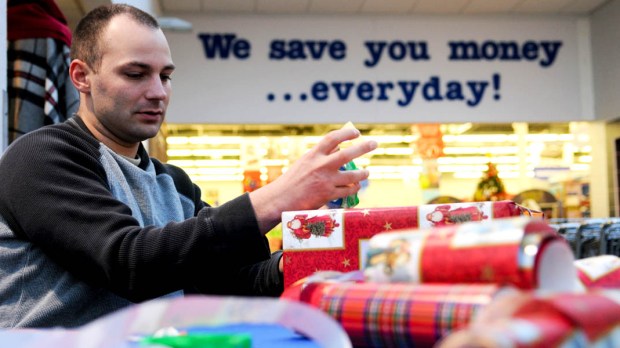How would you answer: “Don’t ruin my Christmas with religion!”
That was yelled at me as a teen, upon arriving at a Christmas party after serving Midnight Mass. It seemed odd to me how religion might “ruin” his Christmas; no one asked him to stop watching “It’s a Wonderful Life” on television. Ironically, my Christmas had already been “ruined”—but in a different way.
A month before, I had read Kahlil Gibran’s haunting short story, “Eventide of the Feast.” Jesus laments that he’s more ignored than ever at Christmastime, because people are too busy celebrating his birth to notice him. I use that story to start my Advent examination of conscience: Am I too busy with Christmas to welcome Christ?
Looking around, I see that Christ isn’t welcome this Christmas season. The DC Metro Authority won’t run Catholic Christmas advertisements. A federal court rejected an archdiocesan plea. Beyond the Christmas season, some churches urge the removing of crosses, pulpits and altars to make “refugees feel more welcome.”
I was recently asked, “Is there no more hospitality for Christ?” I replied: “Is there no more hospitality for Christians?” Paris has cancelled its annual Christmas market this year, claiming that the wares sold are not up to the high standards of Paris. Lyons’ Christmas market has also been cancelled, because organizers can’t afford to pay for the security barriers necessary to keep terrorists from driving trucks into the crowds. No one had ever thought of such measures as a necessity until the tragedy of the Berlin Christmas market in 2016. As someone who delighted in the Christmas customs of Bavaria some 20 years ago, I was especially saddened to see a photo of a Christmas tree in a town square, behind an 8-foot fence, surrounded by guards with automatic weapons.
These facts and images prompt me to say: “Christ is not welcome this Christmas season; neither are Christians. And we shouldn’t be surprised.”
During the Advent season, while reminded that God has rushed to our rescue to save us from ourselves at a terrible cost to himself, we’re often too busy to notice his presence or hear his voice. During the Christmas season, when we should be marveling at the God-given and God-elevated dignity of the human body and soul—blessings that the world can’t give or even imagine—we’re too busy consuming and reveling in un-human ways to mark the gift of our high calling as creatures made in the image and likeness of the Incarnate God.
Here’s the ironic tragedy of our present state: At Christmas time, Christ can find no welcome in human hearts and Christians can find no welcome in the public square—not even in the lands once known as “Christendom.” What are we to do?
If during Advent, we want to prepare for the arrival of the Word-made-Flesh in our world and lives, if during Christmas we wish to celebrate worthily that the Word-made-Flesh dwells among us, we must start by immersing ourselves in the Word of God. Joining the ancient form of Scriptural meditation which is Lectio Divina to the most praiseworthy practice of the daily Rosary, we sinners can marvel with fresh eyes at the great and costly gift of God working for our redemption. In the company of the sinless Mary, we can look at her beloved Son with a renewed heart, pondering and savoring every word and gesture of our Savior.
If we would prepare a worthy welcome for the saving Lord who wishes to set us free, we must clear the throne of our hearts and banish from them anything that may be unworthy of us and unworthy of our Divine King. Review these “10 Tips from priests for making a better confession” and then go to Confession. Wherever sin is loved, Christ will not enter. He will not compete with our idols—he will only defeat them, on the condition that we invite him in and accept his reign. Advent and Christmas are worthily begun with a good confession.
Perhaps the greatest boast of the Christian is: “The Word was made Flesh and dwelt among us!” But do we dwell with him? Do we reverence and worship him wholeheartedly in the Holy Sacrifice of the Mass and in Eucharistic adoration? Do we visit with Our Blessed Lord within the sanctuary of our hearts? Do we give him our time and attention gladly or grudgingly?
Some folks have claimed that their Christmas is “ruined” by any mention of religion. (What exactly are they celebrating?)
Some claim that public life is “ruined” by the presence of any Christian display.
We must persuade the former and resist the latter—both with charity, prayer and action.
When I write next, I will speak of some overlooked gifts of Christmas. Until then, let’s keep each other in prayer.

